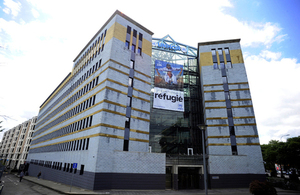UNHCR Executive Committee: UK Statement
This statement was delivered by the UK at UNHCR Executive Committee on on 4 October 2017.

UNHCR's headquarters are in Geneva.
The UK aligns itself with the statement made by the EU on behalf of the EU and its member states.
The challenges facing UNHCR are immense. The numbers of displaced are almost unfathomable, and the environments UNHCR are working in are profoundly complex. In light of this, it’s vital that we all continually challenge ourselves to deliver more and more effectively to ensure that we better meet the needs of those most in need and to deliver value for money for our taxpayers who finance this work.
In this context, it is critical that UNHCR prioritises its resources and looks at ways to improve efficiency. For this reason, the change process highlighted by the High Commissioner in his opening intervention is so important.
There are three areas that the UK would like to work on with UNHCR and others in the coming year.
First, the UK’s commitment to humanitarian principles and protection of the most vulnerable is steadfast. With 142 million people in need of humanitarian assistance globally, it is essential that UNHCR ensures the most vulnerable and at-risk refugees and IDPs are afforded the protection and assistance they so desperately need. The specific needs of people with disabilities, women and girls and those at risk of being forced into modern slavery must be fully integrated within all dimensions of a humanitarian response, alongside continued efforts to combat sexual exploitation and abuse. UNHCR country offices must be resourced properly to tackle these issues in a timely manner and those who commit such heinous crimes must be held accountable.
Second, the Grand Bargain. The UK very much welcomes the update from the High Commissioner on the Grand Bargain. Delivery of the Grand Bargain Commitments and reforming the system through which we deliver humanitarian assistance is crucial if we are to meet the needs of the poorest and most vulnerable. The UK is already doing things differently to meet our Grand Bargain commitments – investing more in crisis preparedness and adopting a more developmental approach to working in protracted crises.
As the UK Secretary of State for International Development said at UNGA last month, the UK will remain one of the largest core funders to the UN’s development and humanitarian agencies. We will continue to provide flexible, un-earmarked multiyear funding to the multilateral humanitarian system, in line with our own Grand Bargain commitments, including to UNHCR.
As one of the world’s largest humanitarian agencies, UNHCR has a central role, working with other agencies, in reforming the humanitarian system. As set out in the UK’s Multilateral Development Review, it’s important that UNHCR continues to work better and more collaboratively with partners on the ground, including with development actors. We want to see improved transparency, increased accountability to beneficiaries, more multi-year programming, and to continue the scale up in the use of cash. In particular, it’s important to use a single cash transfer covering all essential needs that can be accessed in markets. We also want to see full engagement with joint needs assessments that prioritise peoples’ needs rather than agency mandates.
Third, the UK remains fully supportive of the CRRF and UNHCR’s efforts on its roll out. We were grateful for the update earlier this week. The UK commends the leadership of host countries to roll out the CRRF and we welcome initial progress being made in the first phase rollout countries. At its heart, the CRRF is about us all adopting a different approach to protracted refugee crises: taking a longer term development-focused approach; bringing in new actors, such as the World Bank; and aligning with host government development plans and priorities. Supporting effective roll-out of the CRRF and delivering more effective coordination in these contexts requires UNHCR to make sure that it has the right staff with the right skills on the ground at the right time. This shift will require continued assessment and lesson learning which should in turn inform the development of the Global Refugee Compact.
Whilst I have the floor, please let me take the opportunity to express my government’s deep concern for more than half a million Rohingya who have been forced to flee their homes. Once against highlights the importance of humanitarian access to those most in need.
Let me conclude by saying that UNHCR continues to play a pivotal role and we are truly grateful to the staff who put themselves in harm’s way in some of the most difficult contexts to ensure that the needs of the most vulnerable are met. The multitude of challenges we face in 2017 will continue into 2018 and beyond. If we are to meet these challenges, it’s essential that UNHCR continues to challenge itself to do better, to reform, and continually improve to deliver sustainable, lasting solutions to those in need.